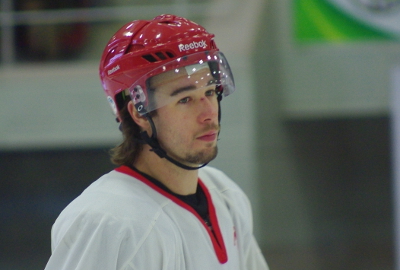Grenoble dominates Angers to clinch 9th Ligue Magnus title
Brûleurs de Loups seal the title at home with dominant Game 5 victory as veterans Hardy and Fleury bid farewell to the ice Read more»

Eurohockey.com's Matthew Cross talks to Rob Jarvis, a Canadian that has played in France but now plays with the China Dragons.
Rob Jarvis is one of three Canadians playing for the China Dragon this season. He's previously played in the IHL and CHL as well as the French hockey league with the Dijon Les Ducs. Recently he sat down with Eurohockey to give his perspective on the leagues and talk a bit about Chinese hockey.
Eurohockey: Tell us a little about yourself
Rob Jarvis: My name is Rob Jarvis born in 1985 I'm 27 years old. This is my fifth year playing in professional hockey. I spent 2 years in the States playing there before going to Europe where I played 2 years in France and then came here this year year to China to the Asian League. Previous to my professional career I went to school for five years, three in the states, Dartmouth College in New Hampshire and two years at Ottawa U. That's where I'm from. I returned home for 2 years and finished my degree there. I studied history and economics, while I was in France I also did a Masters MSC in international management, been trying to use hockey to my advantage as much as I can.
EH: You spent your last 2 years in France, what was it like playing there? How would you compare their style to the central hockey league and Canadian styles?
RJ: The French hockey League compared to the central hockey and IHL? I'd say the speed is on par, certainly the skill is there. It's the same thing with this Asian League as in Europe, it's less physical. I think the fans aren't as blood thirsty. That translates into the game itself, It's just a little bit more, more easier to play. Less physical on the body and definitely a lot more skill utilized cause you're not always looking over your back worried that someone is going to crush you from behind or do something stupid.
EH: Obviously playing for the Chinese team is a little tough, historically they haven't done great in the last few years, especially since the other teams really started picking up their programs. What do you think would really benefit the Chinese program the most?
RJ: That's a tough question, where to start? It seems like there are a lot of things that have gone wrong with this organization, but I think today they are trying to move forward. That's why we're here, that's why we have 3 Canadians to try and instill some sort of different value system in the team. I think they could really utilize more Canadian influence more North America influence any time you have a culture that's really down beaten, down trodden, it's been year after year, you haven't won a game, you need some sort of fresh blood in there. Certainly as Canadians or Americans, or anyone from the Western world, we understand the game, I certainly come from a culture of hockey in Canada. i think having Canadians around is only going to benefit the guys. You need really a mentality change, and for me that would start all the way at the top and work its way down. And how you do that, it takes time it takes patience. For us it's frustrating obviously, because it doesn't come quickly, but I think step by step it's going to get better.
EH: Do you find the players are able to maintain their enthusiasm and drive despite the results? Do they look at every game as a learning experience?
RJ: It's funny, they stay amazingly positive. They don't know really what winning is, so anytime you can't really measure yourself against something, it's difficult to say. It's a pretty resilient group, despite our woes. We keep positive as much as we can, obviously it goes without saying that it gets negative in there sometimes. It's not always the best, but I think the majority of the time the guys try to keep a smile and keep going.
EH: You've met most of the teams in the Asia League so far, are there any domestic players that have really stood out to you? Any that you've thought, oh this guy could do really well in say Europe or North America?
RJ: I think the majority of the imports they come from having had experience throughout the years a lot of played in the AHL, I think a lot of them have come from playing in Germany playing in the DEL there.
[Interviewer: How about any of the Japanese or Korean players?]
Certainly a lot of them. I couldn't tell you by name which ones or which teams a lot of the Japanese guys, and the Koreans, especially here, they seem to be fantastic, great skaters, really good puck movers. Skill wise they're really on par. For them to really benefit they need to take the League to the next level where it becomes more physical where it becomes more competitive. Obviously I would measure them up against our team which is difficult to say because we don't always bring the best game. They seem to look very good around us, who knows how they look against other teams.

EH: Where would you like to take your career after this season? Is there a particular league or team you have in mind as a goal to reach?
RJ: Personally I think I came here knowing this is a work in progress, this was not going to be a simple or short term sort of thing. I'd like to stay here, I see a lot of potential with hockey in China, obviously there is a huge market, there is lots of good people part of the organization. Lots of good young Chinese kids that could certainly benefit from having someone like me with a little more experience around. And I don't want want to give up on the team. I think it's easy to get frustrated not win a game all year and take off. That would not be a great finish. I would see myself wanting to stay and wanting to progress and having a bit of an evolution with this team. Certainly that is my goal to help Chinese hockey as much as I can, and ultimately help hockey in Asia.
EH: Is there anything that you think that would really help spur the popularity of hockey in China or Asia in general? Do you think it's a hopeless cause to really expect big attention in this area for a winter sport?
RJ: I think right now the women's team seems to get a lot more funding. Because they're better on the national stage. All it takes is a little bit of competitiveness, for us to start winning games. We don't really market our team right now. A lot of that is based on the tensions between Japan and China this year and it's a bit of an odd situation. We're not really getting fans to the games. We're kind of closing the gates. I'd like to see it open up. I'd like to see the team year by year get better. I know that will translate into the youth and the younger people taking more interest in the sport. I think it's the best sport in the world. I think it's exciting, any first time fan sees hockey loves it. They're always intrigued by its speed and intensity. The market is unbelievable in China. I think it's only a matter of time, and right management, before it can take off.
EH: How was the process of moving to China and getting settled for you?
RJ: Strangely enough, I'd always had an interest in China, Asia. I'd never been here. When I finished my season in Dijon, France, I boarded a plane from Paris to Beijing and I did a little tour of China. Shanghai, Beijing and Hong Kong. I was a little bit familiar with it. I wanted to come here and I'd heard about this League. So everything kind of fell into place. I got here, certainly I was well treated, the organization treats me well. We all live in a hotel which is a little particular, it's a good way to bond with your teammates.
[Interviewer: Even the Chinese players?]
Absolutely everybody, including the coach. Right through to the goalies and the translators. We all live side by side. The food has been a bit of a challenge, to be honest. We're eating hotel food, but that's more of a personal level.
[Interviewer: Do you find that situation difficult for say some of the older players who have families?]
We had one older Canadian, Rob McFeteers, who was here with us until a couple weeks ago when he returned to Germany where he has been playing for the last five years, he certainly found it a little bit more challenging. Living in a hotel, not really having that personal space, as you need as you get older. You don't want to sit around in a boys club all the time and bond with the young guys. It's been challenging for everybody and I know challenging for him, and myself, I like challenges.
EH: How are the dynamics on the team? The other teams have some imports, but the Chinese team has a real mix of Chinese, Japanese and Canadians. How does that get together for your dynamic and communication?
RJ: Works okay, but it's not the best situation. Language and communication is important when you're playing a sport. As much as it is truly a global game, and you can figure out words to get by explaining subtle things, communicating with your players and bonding with your players isn't as easy when you can't speak the same language. We have a translator, obviously that speaks English, Japanese and Chinese, and he translates everything. That loses a lot of efficiency when we're practising or having team meetings. So it's a constant challenge. It's not that it can't be over come but it's there and it hangs over us.
EH: Thanks for your time!
 Cameron Gaunce
(D)
Cameron Gaunce
(D)
 Fehervar AV19
Fehervar AV19 Marko Csollak
(D)
Marko Csollak
(D)
 Fehervar AV19
Fehervar AV19 Josh Atkinson
(D)
Josh Atkinson
(D)
 Fehervar AV19
Fehervar AV19 Daniel Gheorghiu
(D)
Daniel Gheorghiu
(D)
 Forshaga IF
Forshaga IF Grästorps IK
Grästorps IK Chase Berger
(F)
Chase Berger
(F)
 Fehervar AV19
Fehervar AV19 Guillaume Naud
(F)
Guillaume Naud
(F)
 Rouen Dragons
Rouen Dragons Eisbären Regensburg
Eisbären Regensburg David Elsner
(F)
David Elsner
(F)
 Blue Devils Weiden
Blue Devils Weiden EV Landshut
EV Landshut
 Czech Rep.:
Tipsport extraliga |
1.liga |
2.liga
Czech Rep.:
Tipsport extraliga |
1.liga |
2.liga
 Slovakia:
Tipsport Extraliga |
1.liga
Slovakia:
Tipsport Extraliga |
1.liga
 Sweden:
SHL |
HockeyAllsvenskan
Sweden:
SHL |
HockeyAllsvenskan
Other: EBEL | Belarus | Croatia | Denmark | Estonia | France | Great Britain | Iceland | Italy | Latvia | Lithuania | MOL-liga | Norway | Poland | Romania | Serbia | Slovenia | Spain | NHL | AHL |
Brûleurs de Loups seal the title at home with dominant Game 5 victory as veterans Hardy and Fleury bid farewell to the ice Read more»
The transnational influence of European NHL players has become a transformative force in reshaping hockey development programs across their home nations. By importing NHL-caliber training methodologies while funding grassroots initiatives, these athletes are driving measurable growth in participation and competitive outcomes. ... Read more»